From Fungi to Fantastic: Exploring the Fascinating World of mushrooms spores uk
Step into the enchanting world of mushrooms spores uk as we embark on a journey through the diverse landscapes of the United Kingdom. From the mystical forests of Scotland to the rolling hills of Wales, the UK is home to a captivating array of fungi that will leave you in awe. Join us as we delve into the intricate biology of these tiny spores and discover the hidden wonders they hold. Uncover the secrets of their reproduction, their role in the ecosystem, and the fascinating ways in which humans have harnessed their power for centuries. Whether you’re a nature enthusiast, a budding mycologist, or simply curious about the extraordinary beauty of the natural world, this exploration of mushroom spores in the UK will ignite your imagination and leave you with a newfound appreciation for the magic that lies beneath our feet.
BUY MAGIC MUSHROOM SPORES IN UK
Mushroom spores play a crucial role in the reproduction of fungi. These microscopic structures are responsible for the dispersal of fungi and the continuation of their life cycle. When a mushroom reaches maturity, it produces countless spores, each containing the genetic material necessary to create a new organism. These spores are released into the environment and can be carried by wind, water, or animals to new locations where they can germinate and give rise to a new generation of fungi. This remarkable process ensures the survival and propagation of fungal species across the UK and beyond.
Mushroom spores are produced in the gills or pores of the mushroom cap. As the mushroom matures, the spores develop and are eventually released into the surrounding environment. The number of spores produced by a single mushroom can be staggering, with some species capable of producing millions of spores. This abundance increases the chances of successful dispersal and colonization in different habitats.
The life cycle of fungi is fascinating and complex. It begins with the germination of a spore, which gives rise to a mycelium, a network of thread-like structures that spread through the substrate. The mycelium absorbs nutrients from its surroundings, enabling it to grow and eventually form a fruiting body, such as a mushroom. The fruiting body’s primary purpose is to produce and disperse spores, ensuring the continuation of the fungal species.
Mushroom Spore Dispersal Methods
mushrooms spores uk have evolved various strategies for dispersal, allowing them to colonize diverse environments and adapt to changing conditions. Wind dispersal is one of the most common methods employed by mushroom spores in the UK. Spores with lightweight structures and unique shapes, such as those found in the genus Coprinus, are easily carried by the wind over long distances. This method enables fungi to reach new habitats and establish themselves in different ecosystems.
Water dispersal is another important mechanism for mushroom spores, particularly for species found in wet environments. Some fungi produce spores with a gelatinous coating that allows them to float on water. These spores can be carried by streams, rivers, and even rainwater, facilitating their distribution across the UK’s numerous water bodies. This method ensures the dispersal of spores to wetland areas and helps fungi adapt to water-dependent habitats.
Animals also play a significant role in the dispersal of mushroom spores. Some fungi produce spores with sticky surfaces or structures that can attach to the fur, feathers, or exoskeletons of animals. These spores are then carried to new locations as the animals move, allowing fungi to colonize different habitats. In the UK, mammals like squirrels and deer, as well as birds and insects, contribute to the dispersal of mushroom spores by acting as unwitting carriers.
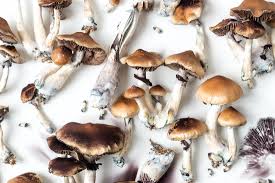
The Importance of Mushroom Spores in the Ecosystem
Mushroom spores are not only essential for the reproduction of fungi but also play a vital role in the overall health and functioning of ecosystems in the UK. Fungi are known as nature’s recyclers, breaking down dead organic matter and returning nutrients to the soil. This decomposition process is facilitated by the action of fungi’s mycelium, which secretes enzymes that break down complex organic compounds into simpler forms that can be absorbed by plants and other organisms.
BUY MAGIC MUSHROOM SPORES IN UK
Mushroom spores contribute to this process by colonizing dead organic matter, such as fallen leaves, decaying wood, and animal carcasses. As the spores germinate and grow, they release enzymes that break down the organic matter, allowing the mycelium to absorb the nutrients and continue the decomposition process. This nutrient cycling is essential for maintaining the fertility of soils and supporting the growth of plants in the UK’s diverse ecosystems.
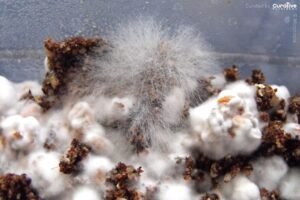
Furthermore, mushroom spores provide food for a wide range of organisms. Insects, such as beetles and flies, often feed on the spores and contribute to their dispersal. Small mammals, like mice and voles, also consume mushroom spores, while birds and other animals feed on the fruiting bodies themselves. This interconnected web of interactions demonstrates the integral role that mushroom spores play in sustaining biodiversity and ecological balance in the UK.
The UK is home to a rich diversity of mushrooms spores uk s, each with its unique characteristics and ecological preferences. Some of the most common types of mushroom spores found in the UK include:
1. Agaricus bisporus: Also known as the common button mushroom, this species is widely cultivated and consumed worldwide. Its spores are released from the gills and are typically brown in color.
2. Amanita muscaria: Recognizable by its vibrant red cap and white spots, this iconic mushroom produces white spores. It is often associated with fairy tales and folklore. incubators lighting and electrical flowhoods
3. Coprinopsis atramentaria: Commonly known as the inky cap or alcohol ink cap, this mushroom produces black spores that are used in forensic science for bloodstain identification.
4. Psilocybe semilanceata: Also known as the liberty cap, this small mushroom is known for its hallucinogenic properties. Its spores are dark purple-brown.
These are just a few examples of the many mushroom spores that can be found throughout the UK. Each species has its unique characteristics, including spore color, shape, and size, which can aid in their identification and classification.
mushrooms spores uk Identification Techniques
Identifying mushroom spores can be a challenging but rewarding endeavor. Accurate identification is crucial for understanding the ecological role of fungi and distinguishing between edible and poisonous species. Several techniques can be employed to identify mushroom spores:
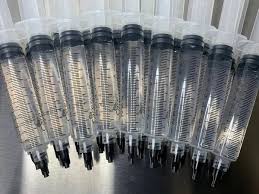
1. Spore Prints: Obtained by placing a mushroom cap on a piece of paper or glass, spore prints can reveal the color and pattern of the spores. This information is often a key characteristic used in identification.
2. Microscopic Examination: By extracting spores from a mushroom and observing them under a microscope, their size, shape, and ornamentation can be examined. These features can provide valuable clues for identification.
3. DNA Analysis: Advanced techniques such as DNA sequencing can be used to identify mushroom spores by comparing their genetic material to existing databases. This method offers a high level of accuracy but requires specialized equipment and expertise.
Combining these techniques with field observations, including the mushroom‘s habitat, cap color, and stem characteristics, can help increase the accuracy of mushroom spore identification in the UK.
While mushrooms are commonly consumed as a food source, the spores themselves are less commonly utilized in culinary applications. However, in some cultures, mushroom spores are used as a seasoning or flavor enhancer. The unique taste and aroma of different mushroom spores can add depth and complexity to dishes, similar to how spices are used in cooking.
Mushroom spores can also be used to create a variety of gourmet products. Truffle-infused oils, for example, are made by steeping mushroom spores in high-quality oils, resulting in a rich and aromatic flavor. These oils can be drizzled over salads, pasta, or used as a finishing touch on various dishes. Additionally, mushroom spores can be ground into a fine powder and used as a natural food coloring agent, adding a touch of earthy hue to desserts and baked goods. agar liquid culture lab work
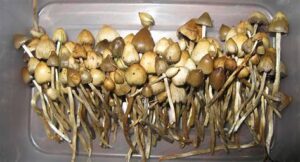
Although the use of mushrooms spores uk in cooking is not as widespread as the use of mushroom fruiting bodies, their unique flavors and versatility offer exciting possibilities for culinary experimentation.
The Use of Mushroom Spores in Medicine and Research
Mushroom spores have been used in traditional medicine for centuries, particularly in Eastern cultures such as China and Japan. Certain mushroom species, such as Ganoderma lucidum (reishi) and Cordyceps sinensis, are believed to possess medicinal properties and have been used to treat various ailments. The spores of these mushrooms are often harvested and processed into powders, extracts, or capsules for consumption. spores ml uk
In recent years, scientific research has also shown promising results regarding the potential health benefits of mushroom spores. Studies have suggested that certain mushroom spores possess antioxidant, anti-inflammatory, and immune-modulating properties. These findings have led to the development of mushroom-based dietary supplements and pharmaceutical drugs that harness the power of mushroom spores for human health.
Furthermore, mushrooms spores uk are invaluable resources for scientific research and mycological studies. Researchers rely on spore samples to study the genetic diversity, evolution, and taxonomy of fungi. By analyzing the DNA contained within spores, scientists can gain insights into the relationships between different fungal species and their ecological roles. This knowledge is crucial for understanding the impact of fungi on ecosystems and developing strategies for conservation and sustainable management. flowhoods incubators lighting and electrical
Cultivating mushrooms spores uk
Cultivating mushrooms from spores is a fascinating process that allows individuals to grow their own fungi at home or in commercial settings. While it can be more challenging than growing mushrooms from pre-existing mycelium or spawn, starting from spores offers a unique opportunity to observe the entire life cycle of the fungus.
The process typically involves creating a sterile environment to prevent contamination, germinating the spores on a suitable substrate, and providing the optimal conditions for growth. Different species require specific environmental conditions, such as temperature, humidity, and light, to thrive. Patience, attention to detail, and a basic understanding of mushroom cultivation techniques are key to successful spore-based mushroom cultivation.
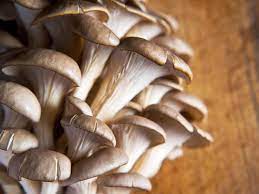
Cultivating mushrooms from spores not only provides a rewarding and educational experience but also contributes to the conservation of genetic diversity. By growing mushrooms from wild-collected spores, individuals can help preserve unique strains and prevent the loss of valuable genetic resources.
Conservation Efforts for Mushroom Spores in the UK
As the importance of fungi in maintaining ecosystem health becomes increasingly recognized, conservation efforts for mushroom spores in the UK are gaining momentum. Protecting fungal diversity and habitats is crucial for preserving the intricate web of interactions that fungi participate in, and for maintaining the overall balance of ecosystems.
Conservation initiatives focus on various aspects, including the preservation of important fungal habitats, such as ancient woodlands and wetlands, which support a high diversity of mushroom spore-producing species. These efforts involve advocating for the protection of these habitats, raising awareness about the ecological importance of fungi, and promoting sustainable land management practices. sterilized and raw mushroom growing
BUY MAGIC MUSHROOM SPORES IN UK
Additionally, citizen science projects play a vital role in monitoring and documenting mushroom spore diversity in the UK. By engaging the public in data collection and observation, these projects contribute to our understanding of fungal distribution and abundance. They also help identify areas of conservation concern and guide future conservation efforts.
Conclusion mushrooms spores uk
The world of mmushrooms spores uk is a captivating realm filled with beauty, complexity, and endless wonder. From their role in fungi reproduction to their importance in the ecosystem, mushroom spores hold the key to understanding the hidden mysteries beneath our feet. Their diverse methods of dispersal, the astonishing array of species found in the UK, and their significance in culinary, medicinal, and research fields make them truly extraordinary.
As we explore the enchanting landscapes of the United Kingdom, let us remember to appreciate the magic of mushroom spores and their vital role in sustaining life on Earth. By supporting conservation efforts, engaging in scientific research, and cultivating our own mushrooms, we can contribute to the preservation and appreciation of these fascinating organisms. So, step into the world of mushroom spores, and prepare to be amazed by the fantastic journey that awaits you.
